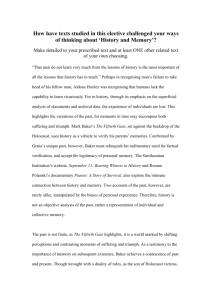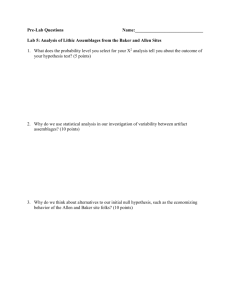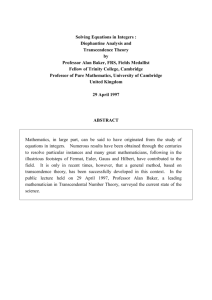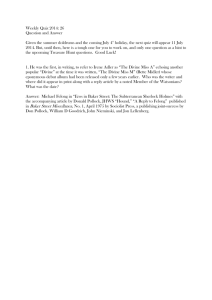History and Memory Essay. - The Fiftieth Gate
advertisement
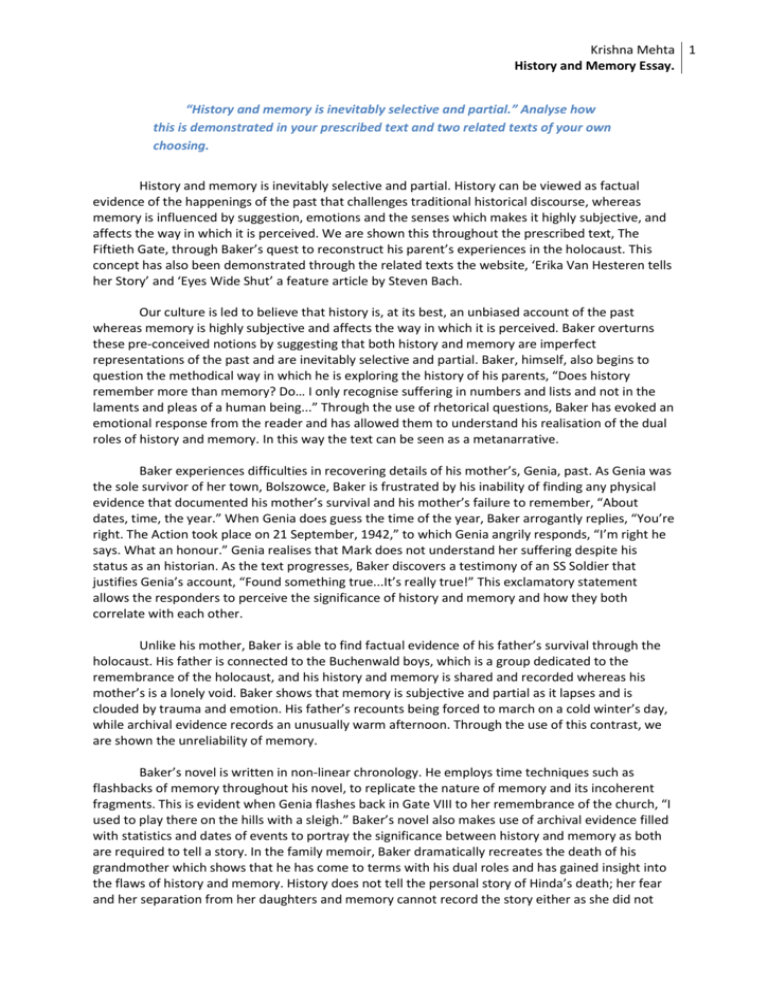
Krishna Mehta 1 History and Memory Essay. “History and memory is inevitably selective and partial.” Analyse how this is demonstrated in your prescribed text and two related texts of your own choosing. History and memory is inevitably selective and partial. History can be viewed as factual evidence of the happenings of the past that challenges traditional historical discourse, whereas memory is influenced by suggestion, emotions and the senses which makes it highly subjective, and affects the way in which it is perceived. We are shown this throughout the prescribed text, The Fiftieth Gate, through Baker’s quest to reconstruct his parent’s experiences in the holocaust. This concept has also been demonstrated through the related texts the website, ‘Erika Van Hesteren tells her Story’ and ‘Eyes Wide Shut’ a feature article by Steven Bach. Our culture is led to believe that history is, at its best, an unbiased account of the past whereas memory is highly subjective and affects the way in which it is perceived. Baker overturns these pre-conceived notions by suggesting that both history and memory are imperfect representations of the past and are inevitably selective and partial. Baker, himself, also begins to question the methodical way in which he is exploring the history of his parents, “Does history remember more than memory? Do… I only recognise suffering in numbers and lists and not in the laments and pleas of a human being...” Through the use of rhetorical questions, Baker has evoked an emotional response from the reader and has allowed them to understand his realisation of the dual roles of history and memory. In this way the text can be seen as a metanarrative. Baker experiences difficulties in recovering details of his mother’s, Genia, past. As Genia was the sole survivor of her town, Bolszowce, Baker is frustrated by his inability of finding any physical evidence that documented his mother’s survival and his mother’s failure to remember, “About dates, time, the year.” When Genia does guess the time of the year, Baker arrogantly replies, “You’re right. The Action took place on 21 September, 1942,” to which Genia angrily responds, “I’m right he says. What an honour.” Genia realises that Mark does not understand her suffering despite his status as an historian. As the text progresses, Baker discovers a testimony of an SS Soldier that justifies Genia’s account, “Found something true...It’s really true!” This exclamatory statement allows the responders to perceive the significance of history and memory and how they both correlate with each other. Unlike his mother, Baker is able to find factual evidence of his father’s survival through the holocaust. His father is connected to the Buchenwald boys, which is a group dedicated to the remembrance of the holocaust, and his history and memory is shared and recorded whereas his mother’s is a lonely void. Baker shows that memory is subjective and partial as it lapses and is clouded by trauma and emotion. His father’s recounts being forced to march on a cold winter’s day, while archival evidence records an unusually warm afternoon. Through the use of this contrast, we are shown the unreliability of memory. Baker’s novel is written in non-linear chronology. He employs time techniques such as flashbacks of memory throughout his novel, to replicate the nature of memory and its incoherent fragments. This is evident when Genia flashes back in Gate VIII to her remembrance of the church, “I used to play there on the hills with a sleigh.” Baker’s novel also makes use of archival evidence filled with statistics and dates of events to portray the significance between history and memory as both are required to tell a story. In the family memoir, Baker dramatically recreates the death of his grandmother which shows that he has come to terms with his dual roles and has gained insight into the flaws of history and memory. History does not tell the personal story of Hinda’s death; her fear and her separation from her daughters and memory cannot record the story either as she did not Krishna Mehta 2 History and Memory Essay. survive. Therefore, Baker, uses the knowledge he has gained as an historian and the understanding he gains as a son to recreate the horror of her death. Through the use of present tense and first person, “I am Hinda,” Baker makes the chapter more emotional. By going through ‘A journey through memory’ and searching for archival evidence to validate memory, The Fiftieth Gate effectively represents one of the most dramatic times in human history and helps convey to modern audiences the emotions that the holocaust survivors experienced. The recount, Erika Van Hesteren tells her story, also portrays that history and memory are selective and partial as it is a personal recount of a holocaust survivor on a website. The text was obtained from Erika Van Hesteren by her giving an interview at her home in Amsterdam, 1986. This text portrays Erika’s life in hiding during the Nazi regime. Erika’s recount begins with her past experiences affecting her present as she begins with, “Until seven years ago, I never talked about any of these things. I just couldn't. Then something happened, a very trivial event, really. ” This shows us how memory, although it may be entrenched in the past, is alive and active in the lives of individuals. Erika makes use of times and dates of certain events such as, “The ‘hunger winter,’ 1944,” to ensure the validity of her memories. This illustrates the concepts that history may provide the more objective, analytical and fact based interpretation, while memory conveys the human meaning and significance of past events. The layout of the website also allows the responder to understand that both history and memory are required to tell a story. The website’s use of several photographs is also an important technique used to highlight the restrictions being placed on Jews and their deportation during the Nazi regime. There are several photographs portraying the, “More and more restrictions,” that were being placed against the freedom of the Jews such as ‘The Jewish district.’ The photograph of a beaming, Erika, before the Nazi regime is contrasted with a picture of Jews huddled together awaiting deportation in Amsterdam, 1943. The pictures are in black and white which portrays their authenticity. Therefore, it is now obvious that the text, Erika Van Hesteren tells a story, is a multi-layered text that can be read as both a personal memoir and history. The extract from the biography The Life and Work of Leni Riefenstahl by Steven Bach also demonstrates how history and memory can be inevitably selective and partial. The text explores the ambiguity and questions that have arisen when personal memory is in sharp contrast to recorded history. Riefenstahl is remembered as turning, “Hitler into a messianic figure in films like Triumph of the Will, but Leni Riefenstahl denied to the end of her life that she was a Nazi.” Bach uses the jargon of film making such as aerial photography, close-ups and point of view that Leni has utilised in her film to show how Leni had influenced the development of Hitler’s profile. Riefenstahl claims that she, “Unreservedly rejected his racist ideas,” but uses lyrical imagery that is, “unmistakably messianic.” By juxtaposing the two perspectives of Riefenstahl’s personal reflections and biographical evidence, Bach is able to demonstrate that history and memory are inevitably selective and partial. We are shown that memory and history are inevitably selective and partial when Riefenstahl denied witnessing a massacre of three hundred Polish civilians. With the use of rhetoric, “If she witnessed the massacre and protested, as her testimony indicates, why not take credit for denouncing brutality?” Bach portrays the ambiguity shadowing the true nature of the testimony Krishna Mehta 3 History and Memory Essay. because if she did witness the massacre, “Her claim to naivety was fatally compromised.” The article’s use of photographs provides us with historical evidence as it includes a photo of Riefenstahl in obvious distress, which was taken during the Polish massacre. Her ambiguous nature is encapsulated in the paradoxical headline, “Eyes Wide Shut,” which suggests Riefenstahl’s blindness towards the Nazi regime. Thus, we can see that memory like history is able to be distorted and are both inevitably selective and partial. Riefenstahl contends that “Triumph of the Willis a ‘purely historical film’ without a ‘single reconstructed scene.’” This shows that history is at its best subjective like memory can be both selective and partial. It is now obvious that the texts, ‘The Fiftieth Gate,’ ‘Erika Van Hesteren tells her story,’ and, ‘Eyes Wide Shut,’ portray the significance of the medium in the representation of the relationship between history and memory. All these texts allow the responder to arrive at the destination with a greater understanding that history may provide the more objective interpretation whilst memory conveys human meaning.



